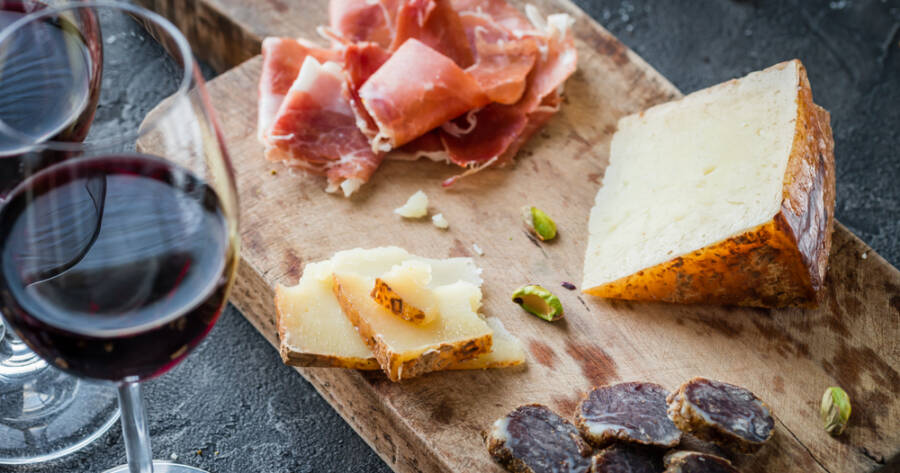In countries like Italy, Spain, Portugal, and southern France, wine and cheese aren’t seen as dietary sins—they’re celebrated parts of life. And yet, key regions are known for some of the highest life expectancies and lowest rates of chronic illness in Europe. What’s the secret? Rather than restriction, many southern Europeans maintain wellness by embracing balance, quality, and joyful living. Their approach to food, movement, and social connection offers valuable lessons for anyone looking to live well—without giving up life’s little pleasures.
Mindful Portions, Not Elimination
Southern European eating habits are shaped by tradition, not trends. One of the most notable features is the emphasis on small, satisfying portions rather than oversized meals. Cheese is enjoyed in slices, not slabs. Wine is poured with meals, not consumed mindlessly. This approach naturally encourages moderation.
Rather than avoiding rich or flavourful foods, people in southern Europe tend to enjoy them in smaller quantities, often paired with fresh vegetables, legumes, or whole grains. A piece of aged Manchego or Parmigiano is often served with a fresh salad or simple tomato dish. This keeps the overall meal light, even if indulgent elements are present.
This kind of moderation doesn’t feel restrictive—it feels deliberate and satisfying. By focusing on the quality and experience of eating, southern Europeans avoid the cycle of guilt and bingeing often associated with extreme dieting.
The Social Side of Eating
In southern Europe, meals are not just fuel—they’re rituals of connection. Lunches and dinners are often eaten slowly and in good company, whether among family, friends, or neighbours. This communal approach to food has a direct impact on wellness.
Eating slowly in a relaxed atmosphere improves digestion and helps the body recognize satiety cues, which can prevent overeating. Talking, laughing, and sharing stories also reduces stress, which plays a major role in long-term health.
Wine, in particular, is usually consumed alongside food and conversation, not on an empty stomach or in front of a screen. A small glass of red wine becomes part of a larger, richer experience. In this setting, alcohol is less about escape and more about celebration and connection.
Walking as a Way of Life
Another reason southern Europeans manage to enjoy rich foods without negative health effects is their active daily routines. Walking is deeply embedded in the lifestyle. In many towns and cities, narrow streets and scenic plazas encourage people to walk instead of drive. Walking after meals, in particular, is a common tradition—one that supports digestion and prevents blood sugar spikes.
In Mediterranean cultures, taking an evening stroll (known as “la passeggiata” in Italy or “el paseo” in Spain) is a beloved custom. It’s not considered exercise in the modern sense—it’s simply part of daily life. People of all ages walk together, socialise, and stay physically active without going to the gym.
This gentle but regular movement helps balance the occasional indulgence and supports heart health, joint mobility, and mental clarity.
Quality Ingredients and Simple Meals
Southern European diets favour whole, minimally processed ingredients. Meals are often prepared at home, using what’s fresh and in season. While cheese and wine are prominent, they are typically part of a larger, colourful meal that includes vegetables, herbs, olive oil, and lean proteins like fish or legumes.
This way of eating emphasizes flavour and simplicity. A fresh Caprese salad with basil and tomatoes, or grilled sardines with lemon and herbs, can accompany a bit of cheese or a glass of wine while still feeling light and healthy.
When ingredients are high in quality and freshness, there’s less need for heavy sauces, additives, or sugars to enhance flavour. As a result, even indulgent foods are part of a balanced, nourishing whole.
Indulgence Without Regret
Southern European wellness isn’t about denial. It’s about intention, joy, and routine. A slice of cheese or a glass of wine doesn’t derail a healthy lifestyle because it’s part of a wider, well-rounded approach to food and life. Meals are savoured, not rushed. Movement is part of everyday rhythms. And health is measured not just by numbers, but by how people feel and connect.
Across the European Union, there’s growing interest in these time-tested traditions—not just for their health benefits, but for the way they make life more enjoyable. Embracing them doesn’t require moving south—it simply requires slowing down, eating with purpose, and finding pleasure in the everyday. That, perhaps, is the most nourishing habit of all.

